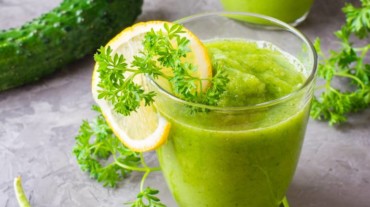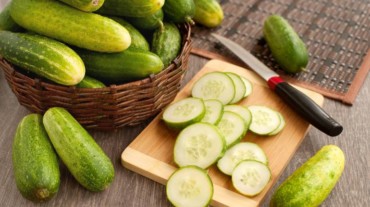7 ways in which your body will react if you eat cucumbers every day
Let’s be honest, the components of an ideal salad almost always contain the good old cucumber! The reason for this is that it has multiple health benefits. You see, cucumber is water-rich and has very few calories.
Cucumber
Cucumbers are popular long, lean, and green garden vegetables. Technically, they’re fruits from the same family as watermelons and pumpkins, but most people consider them veggies.
Cucumbers are native to India, have a slight melon-like taste, and sometimes can be slightly bitter.
Cucumber Types
There are two main types:
Slicing cucumbers are eaten fresh, often in a salad. They can be 12 inches or longer and usually have smooth skin. There are “burpless” varieties that have less of a plant compound called cucurbitacin. That gives them a milder taste, and it may make you burp less after you eat them. You may also hear them called “seedless cucumbers” or “European cucumbers.”
Pickling cucumbers are much smaller and are the type used to make pickles. They can be 3-7 inches long, and they typically have bumps or spines on their skin.
Nutritional Benefits of Cucumber
A serving of cucumber — one-half a cup — is about 8 calories. They have small amounts of vitamin K and vitamin A and are about 95% water. They also have several phytonutrients (plant chemicals) called lignans.
One medium unpeeled, raw cucumber has the following:
- Calories: 30
- Total fat: 0 grams
- Carbs: 6 grams
- Protein: 3 grams
- Fiber: 2 grams
- Vitamin C: 10% of the recommended daily value (DV)
- Vitamin K: 57% of the DV
- Magnesium: 9% of the DV
- Potassium: 12% of the DV
- Manganese: 9% of the DV
Health Benefits of Cucumber
All that water in cucumbers can help keep you hydrated. Plus, the fiber boost they give you helps you stay regular and avoid constipation.
The vitamin K helps blood clot and keep your bones healthy. Vitamin A has many jobs, like helping with vision, the immune system, and reproduction. It also makes sure organs like your heart, lungs, and kidneys work the way they should.
The lignans may help prevent osteoporosis, heart disease, and some cancers.
Antioxidants such as beta carotene in cucumbers can help fight free radicals in your body, unpaired electrons that damage cells and can lead to disease.
Cucumbers may also have health benefits outside your body. Putting them on your skin may help ease sunburn pain, swelling, and damaged skin. That’s why people sometimes put a slice or two under their eyes, hoping to shrink bags and ease puffiness.
Risks of Cucumber
There are few risks to eating cucumbers. One concern may be the pesticides growers use on them. Before you eat them, peel the skin off or wash it in warm running water. That’ll make sure your cucumber is safe to enjoy.
Cucumbers come with a natural wax on their skin. Washing cucumbers after picking them takes away that wax, so producers add a synthetic wax back on before sending them to grocery stores. The wax helps them stay shelf stable longer, but it also holds onto germs. The wax itself isn’t harmful, but peeling the skin before you eat the cucumber can lower the risk of contamination. However, the skin is where most of the nutrients live. A better option may be to buy organic and wash your cukes well before enjoying.
How to Prepare and Store Cucumbers
Most people wash, slice, and toss their cucumbers into a salad. Before you do, you may want to soak them in salt water first. That will lower the amount of water in them and keep the cucumbers from making your salad dressing watery.
You can eat the peel of a cucumber. In fact, it will add fiber and vitamin A to your diet. Just be sure to wash the cucumber first.
When you shop for cucumbers, skip ones that are yellow, puffy, or have sunk-in areas, bulges, or wrinkled ends. Those overripe cucumbers won’t taste great. Instead, look for bright, firm, medium to dark-green, slender cucumbers. Any bruises or dark spots are signs of decay.
Store cucumbers unpeeled in your refrigerator’s crisper drawer. If they have a wax coating that gives them a shiny look, use them within a week. If they don’t have a wax coating, use them sooner. Don’t keep them out at room temperature long, or they will become soft and limp.
Show Sources
University of Missouri Integrative Pest Management: “Cucumber: A Brief History.”
Journal of Food Composition and Analysis: “Classification of fruits and vegetables.”
Colorado Integrated Food Safety Center of Excellence: “Cucumbers.”
University of Illinois Extension: “Cucumber.”
Cleveland Clinic: “Dehydrated? These 7 Foods Will Satisfy Your Thirst and Hunger.”
USDA National Nutrient Database for Standard Reference Legacy Release: “Cucumber, with peel, raw.”
Nutrients: “Contribution of Water from Food and Fluids to Total Water Intake: Analysis of a French and UK Population Surveys.”
National Institutes of Health Office of Dietary Supplements: “Vitamin K,” “Vitamin A.”
Oregon State University, Linus Paulding Institute: “Lignans.”
Fitoterapia: “Phytochemical and therapeutic potential of cucumber.”
Iranian Journal of Public Health: “Determination of Pesticides Residues in Cucumbers Grown in Greenhouse and the Effect of Some Procedures on Their Residues.”
University of Wyoming Extension: “Cool as a Cucumber.”
The World’s Healthiest Foods: “Cucumbers.”
U.S. Food & Drug Administration: “Nutrition Information for Raw Vegetables.”
Fitoterapia: “Phytochemical and therapeutic potential of cucumber.”
The Journal of Nutrition, Health & Aging: “In Vivo Antioxidant Properties of Lotus Root and Cucumber: A Pilot Comparative Study in Aged Subjects.”
McGill University: “Why do they spray wax on apples?”
7 ways in which your body will react if you eat cucumbers every day
There are multiple benefits of eating cucumber on a daily basis, ranging from hydration to glowing skin.

Nikita Bhardwaj Published on: 22 February 2021, 14:58 pm IST
Listen to this article
When it comes to a healthy diet, the mind almost inevitably thinks about a bowl of salad! Well, you can’t deny that salads are loaded with all the essential nutrients that your body needs.
Let’s be honest, the components of an ideal salad almost always contain the good old cucumber! The reason for this is that it has multiple health benefits. You see, cucumber is water-rich and has very few calories.
What’s more, cucumber is high in nutritional value! It contains many important vitamins and minerals. Half a cup of sliced cucumber contains only 8 calories but 1.9 grams of carbohydrates, 0.3 grams of fibre, and 0.3 grams of proteins. It also contains magnesium, potassium, vitamin C, vitamin K, and manganese.
“Eating just one cucumber a day can be great! It mostly contains water. So, even if you were to eat more than one, it won’t cause any harm. In fact, it will keep you full and help you avoid reaching out for any junk food,” said nutritionist Manisha Chopra.
Here are seven things that will happen to your body if you start eating cucumber daily:
1. Your body will stay hydrated
Cucumber is mostly water! Hence, it keeps your body hydrated for a long time.

2. It will prevent constipation
Cucumber is rich in fibre content which prevents constipation and ensures regular bowel movement.
3. Eating cucumbers can help you lose weight
Cucumbers are low in calories and high in nutrients. What’s more, eating cucumber makes you feel full and does away with hunger pangs.
4. It helps in maintaining the blood sugar level
Cucumbers may help you in regulating blood sugar levels. So, it may basically prevent diabetes and other complications related to it.
5. Your immunity will be strengthened
Cucumbers are high in antioxidants. They prevent the accumulation of harmful free radicals. They even reduce the risk of chronic disease.
6. Consuming cucumbers can help with your vision
Cucumber also contains vitamin A which improves our vision.

7. You will thank cucumber for glowing skin
Cucumbers are often used in skincare because they’re extremely soothing to the skin.
Here are some interesting ways to incorporate cucumber into your diet
“Cucumbers are easy to add to your diet. They are crispy and have a refreshing flavour,” said Ms Chopra.
The easiest ways to add cucumber to your daily food include:
- Pickled cucumber
- Baked cucumber chips
- Cucumber salad
- Cucumber sandwich
- Cucumber-infused detox water
- Cucumber cooler
- Cucumber raita
So, ladies, make sure you’re consuming cucumber on a daily basis to stay healthy and fit!
About the Author
Nikita Bhardwaj
Six-pack abs are all that Nikita needs, along with her daily dose of green tea. At Health Shots, she produces videos, podcasts, stories, and other kick-ass content.
HealthShots Community
Read the latest on health trends and learn how to lead a healthy life with the Health Shots Community

With a single click, you can sign up and save anything and everything you’d like to read later. So, sign in RN to get your daily dose of wellness.




Track your Menstrual health using
Healthshots Period tracker






